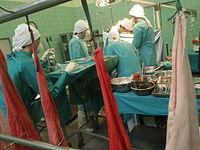
Photo from wikipedia
Anti-thymocyte/lymphocyte globulins (ATGs/ALGs) are immunosuppressive drugs used in induction therapies to prevent acute rejection in solid organ transplantation. Because of animal origin, ATGs/ALGs contain highly immunogenic carbohydrate xenoantigens eliciting antibodies… Click to show full abstract
Anti-thymocyte/lymphocyte globulins (ATGs/ALGs) are immunosuppressive drugs used in induction therapies to prevent acute rejection in solid organ transplantation. Because of animal origin, ATGs/ALGs contain highly immunogenic carbohydrate xenoantigens eliciting antibodies that are associated with subclinical inflammatory events possibly impacting long-term graft survival. Their strong and long-lasting lymphodepleting activity also increases the risk for infections. To circumvent these drawbacks, LIS1 has been engineered as a glyco-humanized polyclonal antibody obtained by immunizing genetically modified pigs knocked out for major xeno-antigens αGal and Neu5Gc. It is Fc-silenced in humans and differs from other ATGs/ALGs by its mechanism of action excluding antibody-dependent cell-mediated cytotoxicity and being restricted to complement and phagocyte-mediated cytotoxicity, apoptosis and antigen masking, resulting in profound inhibition of T-cell alloreactivity in mixed-leucocyte-reactions. Preclinical evaluation in macaques showed that LIS1 impacted CD4+, CD8+ effector T cells but not T-reg, B cells or myeloid cells. Compared with rabbit ATG, LIS1 induced transient depletion of target T cells in the peripheral blood but was equivalent in preventing allograft rejection in a skin allograft model. The novel therapeutic modality of LIS1 might present advantages in induction treatment after organ transplantation by shortening the T-cell depletion period while maintaining adequate immunosuppression and reducing immunogenicity.
Journal Title: Frontiers in Immunology
Year Published: 2022
Link to full text (if available)
Share on Social Media: Sign Up to like & get
recommendations!